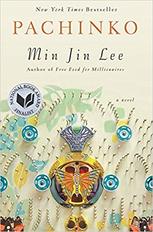 Pachinko: "a type of mechanical game originating in Japan...used as both a form of recreational arcade game and much more frequently as a gambling device, filling a Japanese gambling niche comparable to that of the slot machine in Western gaming." (Wikipedia) "Man, life's going to keep pushing you around, but you have to keep playing." --Mozasu, p.384 With great anticipation, please join us this Wednesday at Maria's house for a discussion of Min Jin Lee's Pachinko. Suggested discussion questions are below. Drop us a line and let us know if we can hope to see you! Discussion Questions: 1. Did you like this book? 2. How does Lee draw the reader into the lives of the bit parts of those mentioned at the beginning -- Hoonie's parents ("an aging fisherman and his wife"), the matchmaker? 3. In a world with little to pass along materially, what gets passed along from generation to generation? What is worth keeping? What should be discarded? 4. Sunja's sister-in-law is elated that she has a sister moving in. Does Sunja's life look promising? What is a woman's life but endless slave labor? 5. Lee mentions several times that Sunja is not beautiful. Why belabor the point? 6. Did your impression of Yoseb change at all after hearing his reasoning about why his wife shouldn't work at the restaurant? (p.178) 7. Hansu...manipulative bastard or guardian angel? 8. Nature vs. nurture: How is Noa more like Ibak than his actual father Hansu? How is Mozasu more like Yoseb than his actual father Isak? 9. What do you make of the title and how it relates to how Mozasu feels about the game and his job as they relate to life? "He loved all the moving pieces of his large, noisy business. His Presbyterian minister father had believed in a divine design, and Mozasu believed that life was like this game where the player could adjust the dials yet also expect the uncertainty of factors he couldn't control. He understood why his customers wanted to play something that looked fixed but which also left room for randomness and hope." (p.296-) 10. What do you make of Yoseb's musings about his regrets in life? Do we regret more the things we have done or the things we have left undone? "What surprised him was that as he felt closer to death, he felt the terror of death, its very finality. There were so many things he had failed to do. There were even more things he should never have done....he had caused others to suffer, and he did not know why he had to live now and recall the series of terrible choices that had not looked so terrible at the time." (p.266-7) 11. How are tradition and family preserved and passed along despite so much tragedy? 12. What of this history do you remember learning about in school? How does Lee's writing make it come alive? 13. Where did this tradition come from of having a one-year-old choose his/her future from items placed in an array in front of him? (p.345) This isn't mentioned for any of the previous births. 14. How could one family endure so much suffering? Was there a part that pushed you over the edge just reading about it? 15. What do you make of the narrative style? Is this omniscient narrator confusing and at times repetitive...or just well done? 16. Anyone feel the book took an abrupt turn when she started delving into homosexuality and the "love forest" in Yokohama? 17. So much death in this book. Is any one more senseless than the others? (so many miscarriages; Hoonie - tuberculosis; Isak - incarceration; Yumi - hit by drunk driver; Noa - suicide; Hana - HIV/AIDS) 18. Was Hoonie's line cursed? Was Noa from a "bad seed"? What role do we play in our own circumstances? What is the role of shame in shaping how we view our circumstances? 19. What do you make of Sunja burying her photos at the end? Will she go to school? Will she discover a new identity? 20. What happens to an author when she toils with an idea for a story for 30 years? Follow-up: Dear Mamas, Thank you so much to Maria for hosting us last night for a discussion of Pachinko. I am looking forward to a new year of discussing books and getting to know each other! Please join us on September 12th as we explore Dave Eggers' Heroes of the Frontier. Hope to see you there!
0 Comments
Leave a Reply. |
Authors
The Tipsy Mamas' Book Club is co-hosted by Corinne Foster and myself, though the spirit of our discussions is flavored by many readers. Archives
November 2022
|